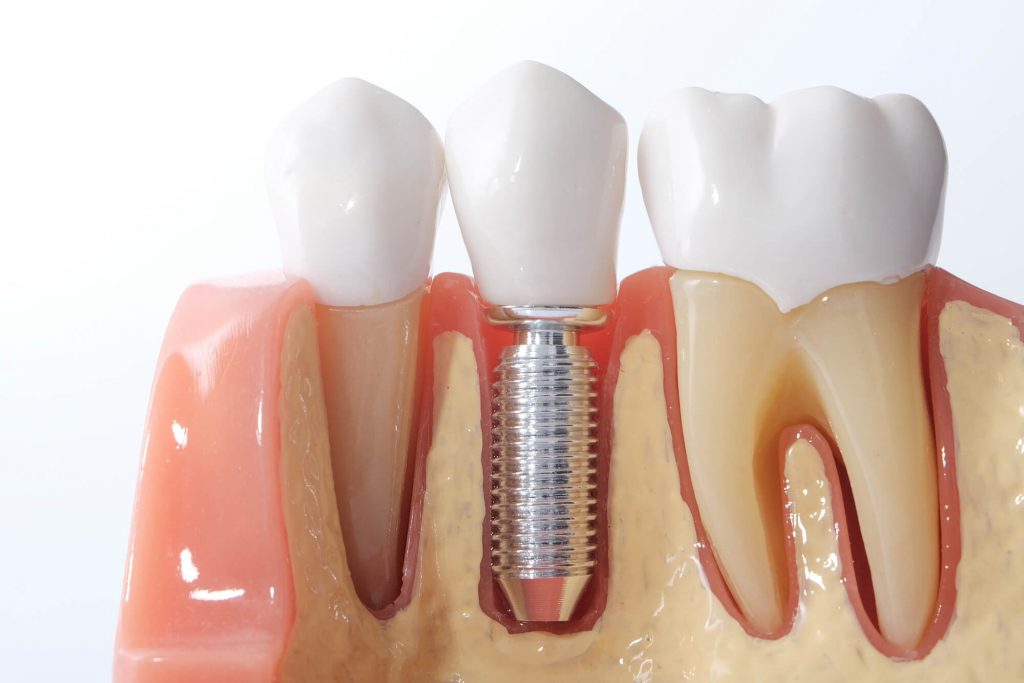If you are looking for the best solution to tooth loss, dental implants in Zebulon are your answer. Dental implants are remarkably strong and extraordinarily durable, and they are impressively reliable, with a 95% success rate.
However, despite their unique features, there are instances where patients experience dental implant problems. Why do these happen, and how do you fix them? Luckily, there are solutions to these common dental implant issues.

Common Problems with Dental Implants
What Are Dental Implants?
Dental implants are artificial tooth roots that your oral surgeon will embed in your jawbone to provide an anchor for your dental crowns. Although the surgery will only take up to one to two hours for each implant, the healing process and the recovery period can take months.
Despite the lengthy time frame, people still love dental implants because they are strong, stable, secure, reliable, and last a lifetime, but certain cases may compromise your implants. It’s important to talk to your dentist and learn about precautions to ensure dental implant success.
What Are Problems Associated with Dental Implants?
Did you know that dental implant failure can happen in less than a year? You’ve been made to believe that implants are durable and can last a lifetime, but why are they acting up in less than 12 months? The following are possible factors contributing to dental implant failure:
Medical Conditions
Certain medical conditions can ultimately lead to dental implant failure, which is why screening is vital before the surgery. Your dental team will thoroughly assess your eligibility before going ahead with the procedure. Besides diseases, lifestyle habits can also compromise the success of dental implant placement.
Examples of factors that can negatively impact how your body heals following surgery are diabetes, gum disease, cancer, smoking, and alcoholism. These conditions can limit osseointegration.
During the screening, be honest with your dental team. Let them know whatever ailments or conditions you may have.
Infection
All surgeries put you at risk of infection, but this can be avoided if you choose an experienced and skilled oral surgeon. The instruments, tools, and equipment used during the surgery must also be sterilized.
Following proper aftercare guidelines is also essential. Keep in mind that your mouth harbors numerous bacteria, so following your dentist’s instructions post-op is critical to reducing your risk of infection.
If, however, an infection does take place, let your dentist know about it immediately. Treating the infection early can prevent dental implant failure.
Procedure Technique
When the proper technique is used, the procedure should go smoothly, but pain, infection, and dental implant failure are likely outcomes if it’s not done correctly.
Insufficient Jawbone
A huge part of dental implant success is having adequate jawbone to support the implants. There should be enough jawbone to grow around the implants. When the bone volume and density are lacking, osseointegration will not be successful.
Osseointegration is the process where the implants permanently fuse with your bone tissues. This is usually the case if you’ve lost some of your teeth for a while. Over time, tooth loss will inevitably lead to bone loss.
Your dentist will evaluate your jawbone and determine if you need bone grafting before the procedure. Pushing through with the surgery despite having an insufficient jawbone will lead to implant failure.
Dental Implant Movement
Your dental implants must remain in place during the healing period. If they move during the first 12 weeks, they will not be able to integrate with your bone successfully.
Instead of bone tissues growing around the implants, soft tissues will take their place, causing pain and loose implants. Remember, it takes roughly 17 weeks for your mouth to heal and the implants to integrate as your jawbone goes through remodeling and mineralization.
Failing to Follow Post-Operative Instructions
After the surgery, you’ll be given a set of guidelines to follow to ensure the procedure’s success. Examples are avoiding strenuous physical activity, avoiding certain foods, making sure your mouth is clean, taking medications as prescribed, etc.
All these are essential to speed up your recovery and healing process. Many patients make the mistake of skipping these guidelines a few days after the surgery because they are already feeling better. As a result, they experience discomfort, infection, and swelling.
Excessive Pressure
Did you know that too much pressure on your implants can lead to long-term implant complications? This is usually a result of not having enough implants in your mouth, incorrect angling, and wrong sizing.
These issues can lead to the formation of periodontal pockets, which are spaces around the implants providing an avenue for bacteria to grow and thrive. Ultimately, this will lead to pain, infection, and dental implant failure.

Need More Information on Dental Implants in Zebulon?
Although these problems may seem daunting, dental implants are still the best choice when replacing missing teeth.
At Tyron Family Dentistry, we make sure you are informed about what to do before, during, and, more importantly, after the surgery to help achieve successful osseointegration and ensure dental implant longevity.
Our team offers patient education and guidance so you can take better care of your oral health. Contact us today for an appointment.

